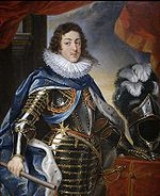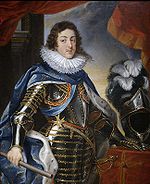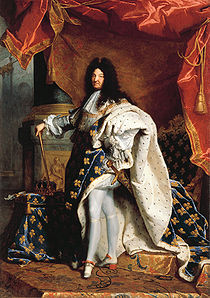
Absolute monarchy in France
Encyclopedia

France
The French Republic , The French Republic , The French Republic , (commonly known as France , is a unitary semi-presidential republic in Western Europe with several overseas territories and islands located on other continents and in the Indian, Pacific, and Atlantic oceans. Metropolitan France...
's political system of absolute monarchy was first initiated in the 16th century. After the period of the reformation monarchy which was mainly based on the political consensus between monarch, social classes and the submissive’s league, absolute monarchy
Absolute monarchy
Absolute monarchy is a monarchical form of government in which the monarch exercises ultimate governing authority as head of state and head of government, his or her power not being limited by a constitution or by the law. An absolute monarch thus wields unrestricted political power over the...
slowly emerged in the 16th century and was finally established during the 17th century.
Background
The 16th century was strongly influenced by religious conflicts developing out of the establishment of lutheranismLutheranism
Lutheranism is a major branch of Western Christianity that identifies with the theology of Martin Luther, a German reformer. Luther's efforts to reform the theology and practice of the church launched the Protestant Reformation...
and permanent wars. However, France’s critical position turned out to be of a central meaning for the formation and theoretical justification of absolute monarchy. Its disputes between monarchy and community as well as the fatal loss of the House of Valois' authority during the second half of the 16th century prompted nation-state theoretical reflections that led to a strengthening of the monarchic central power, so helped to overcome the monarchy’s crisis and to consolidate the internal and external political situation.
Establishing of absolute monarchy
Though earlier French kings had tried to strengthen their power, which was scattered among the nobles, Absolute Monarchy was finally established during the reign of Louis XIIILouis XIII of France
Louis XIII was a Bourbon monarch who ruled as King of France and of Navarre from 1610 to 1643.Louis was only eight years old when he succeeded his father. His mother, Marie de Medici, acted as regent during Louis' minority...
and consolidated during that of Louis XIV
Louis XIV of France
Louis XIV , known as Louis the Great or the Sun King , was a Bourbon monarch who ruled as King of France and Navarre. His reign, from 1643 to his death in 1715, began at the age of four and lasted seventy-two years, three months, and eighteen days...
.
It was Louis XIII’s regent Cardinal Richelieu who vowed "to make the royal power supreme in France and France supreme in Europe." (source: Cardinal Richelieu's Political Testament)
However, many obstacles stood in the way of absolutism in France:
- NobleNobilityNobility is a social class which possesses more acknowledged privileges or eminence than members of most other classes in a society, membership therein typically being hereditary. The privileges associated with nobility may constitute substantial advantages over or relative to non-nobles, or may be...
s had the means to raise private armies and build fortifications. The king did not have the means to raise and keep an army himself and had to rely on these nobles to defend the nation; - Lesser nobles, who had the ability to read and write, also acted as the king's agents. Effectively, they were his representatives of government to the people. They collected taxes, posted edicts, and administered justice.
- The HuguenotHuguenotThe Huguenots were members of the Protestant Reformed Church of France during the 16th and 17th centuries. Since the 17th century, people who formerly would have been called Huguenots have instead simply been called French Protestants, a title suggested by their German co-religionists, the...
s, who since the 1598 Edict of NantesEdict of NantesThe Edict of Nantes, issued on 13 April 1598, by Henry IV of France, granted the Calvinist Protestants of France substantial rights in a nation still considered essentially Catholic. In the Edict, Henry aimed primarily to promote civil unity...
by Henry IVHenry IV of FranceHenry IV , Henri-Quatre, was King of France from 1589 to 1610 and King of Navarre from 1572 to 1610. He was the first monarch of the Bourbon branch of the Capetian dynasty in France....
, held the rights to bear arms and to build fortifications in certain locations.

One of the more unsubtle acts of this consolidation of power was the repeal of the edict of Nantes
Edict of Nantes
The Edict of Nantes, issued on 13 April 1598, by Henry IV of France, granted the Calvinist Protestants of France substantial rights in a nation still considered essentially Catholic. In the Edict, Henry aimed primarily to promote civil unity...
with the Edict of Fontainebleau
Edict of Fontainebleau
The Edict of Fontainebleau was an edict issued by Louis XIV of France, also known as the Revocation of the Edict of Nantes. The Edict of Nantes of 1598, had granted the Huguenots the right to practice their religion without persecution from the state...
in 1685.
A more subtle tactic was the demolition of the nobles castles, disguised as a budgetary act to reduce maintenance costs by removing unnecessary fortifications on the nations interior, this Edict of 1626 removed any ability of the nobles to rebel.
Louis XIV reduced the nobles’ power further by requiring them to spend at least some portion of the year at Versailles
Versailles
Versailles , a city renowned for its château, the Palace of Versailles, was the de facto capital of the kingdom of France for over a century, from 1682 to 1789. It is now a wealthy suburb of Paris and remains an important administrative and judicial centre...
. At Versailles he could watch them and be sure they weren’t plotting against the crown. Rather than seen as demeaning, the nobles took this as a high honor. Nobles, being granted residence at Versailles, were only too happy to give up their duties as government ministers, and Louis XIV, with the help of his minister of finance
Minister of the Economy, Finance and Industry (France)
The Minister for the Economy, Industry and Employment , or Minister of Finance for short, is one of the most prominent positions in the cabinet of France after the Prime Minister....
, Jean-Baptiste Colbert
Jean-Baptiste Colbert
Jean-Baptiste Colbert was a French politician who served as the Minister of Finances of France from 1665 to 1683 under the rule of King Louis XIV. His relentless hard work and thrift made him an esteemed minister. He achieved a reputation for his work of improving the state of French manufacturing...
, replaced them with members of the merchant class who could read and write.
Consequences
The final outcome of these acts did centralize the authority of France behind the king. The replacement of government ministers, removal of castles, and other financial polices of Colbert did reduce French national debt considerably.In the 18th century, however, the relocation of nobles and the sheer obsolescence of Versailles became an important place for a rising merchant class and an instigative press.
Perhaps the most pressing consequence of absolutism in France is the emigration of the Huguenots. Of the merchant class, their emigration effectively leads to a brain drain
Brain drain
Human capital flight, more commonly referred to as "brain drain", is the large-scale emigration of a large group of individuals with technical skills or knowledge. The reasons usually include two aspects which respectively come from countries and individuals...
and a loss of tax revenue for France. Moreover, barred from New France
New France
New France was the area colonized by France in North America during a period beginning with the exploration of the Saint Lawrence River by Jacques Cartier in 1534 and ending with the cession of New France to Spain and Great Britain in 1763...
, they immigrated to other nations, most notably the 13 colonies
Thirteen Colonies
The Thirteen Colonies were English and later British colonies established on the Atlantic coast of North America between 1607 and 1733. They declared their independence in the American Revolution and formed the United States of America...
, taking their skills of printing
Printing
Printing is a process for reproducing text and image, typically with ink on paper using a printing press. It is often carried out as a large-scale industrial process, and is an essential part of publishing and transaction printing....
, glass making, carpentry
Carpentry
A carpenter is a skilled craftsperson who works with timber to construct, install and maintain buildings, furniture, and other objects. The work, known as carpentry, may involve manual labor and work outdoors....
, ceramic
Ceramic
A ceramic is an inorganic, nonmetallic solid prepared by the action of heat and subsequent cooling. Ceramic materials may have a crystalline or partly crystalline structure, or may be amorphous...
s, a deep belief in the needs for freedom of religion
Freedom of religion
Freedom of religion is a principle that supports the freedom of an individual or community, in public or private, to manifest religion or belief in teaching, practice, worship, and observance; the concept is generally recognized also to include the freedom to change religion or not to follow any...
(at least for Protestantism
Protestantism
Protestantism is one of the three major groupings within Christianity. It is a movement that began in Germany in the early 16th century as a reaction against medieval Roman Catholic doctrines and practices, especially in regards to salvation, justification, and ecclesiology.The doctrines of the...
), and the ight to arm
See also
- Ancien Régime
- Early Modern FranceEarly Modern FranceKingdom of France is the early modern period of French history from the end of the 15th century to the end of the 18th century...
- Absolute monarchyAbsolute monarchyAbsolute monarchy is a monarchical form of government in which the monarch exercises ultimate governing authority as head of state and head of government, his or her power not being limited by a constitution or by the law. An absolute monarch thus wields unrestricted political power over the...
- Political absolutism

